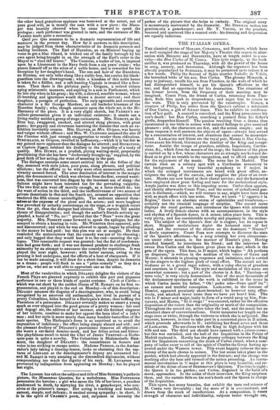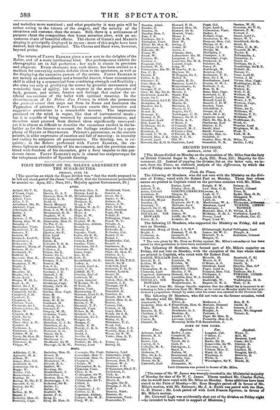THE ITALIAN OPERA.
THE classical operas of Moz kRT, C1MAROSA, and ROSSINI, which have so well occupied the stage of her Majesty's Theatre this season in alter- nation with BELLINI and DoNizarrx, have at length ceded to a no- velty—the Don Carlos of M. Cos. This lyric tragedy, as the book entitles it, was produced on Thursday, with all the pow er of the house in song, scenery, and decoration. Although the argument has been already popularized by &HILLER, it may be permitted us to reduce it to a few words. Philip the Second of Spain marries Isabelle de Valois, the betrothed bride of his son, Don Carlos. The gloomy Monarch, a prey to jealousy, recalls his son from Flanders, in the wars of which he had distinguished himself, to put his Queen's affections to the test, and find an opportunity for his destruction. The situations of the former lovers, from the frequency of their meeting, may be imagined. Count Posa, the friend of Carlos, returning from Flan- ders, finds him sunk in despondency,. and urges him to return to the wars. This is only prevented by the catastrophe. Gomez, a creature of Philip, has stolen from the Queen's cabinet a miniature of Don Carlos, a gift of former times. This he exhibits in confirma- tion of her guilt. A council is convoked, and the King pronounces his son's death : but Don Carlos, snatching a poniard from his father's girdle, despatches himself. The passion resulting from a drama thus constructed is too little in unison with natural feelings to give unmixed pleasure : still, the characters are few, and the action simple ; and in these respects it well answers the objects of opera—always best served by a concentration of interest, and situations that cannot be misunder- stood. LABLACHE and GRIST are the royal pair, MAnto is Don Carlos, FORNASARI his friend, GIUBELEI the familiar of the King and conspi- rator. Amidst the troops of grandees, soldiers, Inquisitors, Carthu- sians, &c., which form the masses of the stage, the business of the piece is carried on by a few, whose characters are so strongly marked and de- fined as to give no trouble in the recognition, and to afford ample time for the enjoyment of the music. The scene lies in Madrid. The curtain rises on a solitary spot with a Carthusian monastery in the background. A very beautiful symphony in F major, in which the stringed instruments are heard with great effect, an- ticipates the rising of the curtain, and supplies the place of an over- ture. Monks are now beard at their choral service; and the harmonies here employed show great feeling and taste for the ecclesiastical style. Ample justice was done to this imposing scene. Carlos then appears, and shortly afterwards Count Posa ; and the secret of unhallowed pas- sion is disclosed,—which, we will venture to say, might have been done with asmuch effect with less noise. When we learn " L' oggetto 6 la Regina," there is an absolute storm of ophicleides and trombones,— certainly not the classical language of surprise. The second scene displays the royal gardens, and introduces the Queen with attendant ladies. A lively female chorus with an accompaniment, in the style and rhythm of a Spanish dance, in A minor, takes place here. This is very pretty, and has considerable novelty and piquancy in the orches- tra. The subject of the Queen's first air is elegant, but its repose is short. Singular modulations depict the harassed state of her mind, and the entrance of the chorus on the dominant " Miscra I" is finely expressive. Count Posa now attempts to discover the state of the Queen's affections--by a song relating her own circumstan- ces under other names, in the manner of Hamlet's play. Having satisfied himself, he introduces his friend ; and the interview be- tween Don Carlos and the Queen gives place to a duet, which is the gem of the opera. This duet, in D major, which begins " Alt perdona un disperato, ' is written in the medium of the voices of Guist and MARIO: it abounds in pleasing responses and imitations, and is carried by the singers to the highest pitch of vocal effect. The second act in- troduces us to a grand regal saloon, with a noisy chorus of grandees and courtiers, in C major. The style and modulation of this scene are somewhat common ; but a part of the chorus in A flat, " Tacciam—si tetro velo," is very nicely harmonized. One of the most favourable of the declamatory specimens of the work is exhibited in the scene in which Carlos meets his father, " Oh! padre mio—frena quell' ira ": an earnest and truthful conception. LABLACEIE, in the costume of Hamlet, appeared peculiarly short-breathed : he however sang effec- tively, and attacked lower notes than we have yet hearl him. The trio in F minor and major, lastly in form of a round sung by him, FoR- NASARI, and MARio, " Ei ti niega! " was encored, rather for the effective disposition of the voices than the originality or merit of the composition. Throughout the second act, action takes the lead, and the music has an abundant share of conventionalisms. GRISI measures her length on the stage once or twice, through the violence to which she is subjected. She recovers, however, in time to take part in a concerted piece in B minor, which proceeds afterwards in D; exhibiting her finest notes and those of LAI:MAMIE. The act closes with the King in high dudgeon with his wife and son. The third act should have opened with a prison-scene ; but this was curtailed, and the hall of the Inquisition in the Palace of Madrid replaced it. Hardly has the gloomy colloquy between the King and the Inquisitors concerning the death of Carlos closed, when a com- pany of ladies enter to tell of the spirit of Charles the Great having ap- peared under the Western tower. This event happily relieves the mo- notony of the male chorus in unison. The last scene takes place in the garden, which had already appeared in the first act; and the change was soothing after the heat and turmoil of the action preceding. An instru- mental introduction in C major at this place is very beantiful, and re- minds of the debut of one of BEETHOVEN s Quintets. The time is night : the Queen is in the garden ; and Carlos, disguised in the habit of a monk, approaches. In the midst of their interview, the King surprises them, and the curtain falls on his son's death and the Queen in charge of the Inquisition. This opera has many beauties, that exhibit the taste and science of M. COSTA very favourably ; but the mass of it is conventional, and drawn from the stock of recollections. As a composition, it wants strength of character and individuality, subjects better wrought out,
and melodies more sustained ; and what popularity it may gain will be rather owing to the talents of the singers, and the novelty of the situations and costume, than the music. Still, there is a seriousness of purpose about the composition that keeps attention alive, with an un- common share of beautiful effects. The charm of Guises and MARIO'S singing is principally displayed in repose: more of this might have been desired, had the piece permitted. The Chorus and Band were, however, beyond praise.



























 Previous page
Previous page